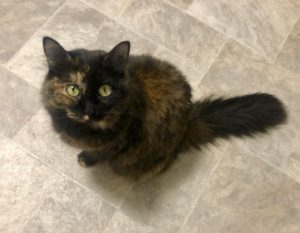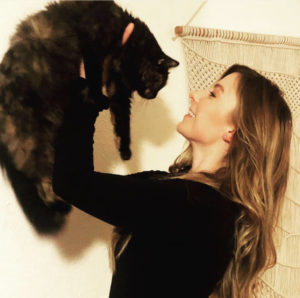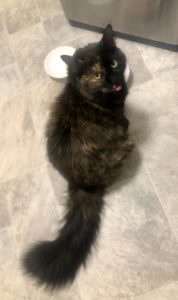Adopting A Shelter Cat With A History of Struvite Crystals
On

Trudy
Giving Tuesday a friend of mine was interested in adopting a beautiful kitty at a pet adoption event held at her workplace. It’s an event looked forward to every year, and this year Rachel felt she was ready to take on the commitment. However, there was just one issue. This shelter cat came with a history of struvite crystals and litter box issues.
Struvite crystals in cats
Knowing my expertise in cat health, she asked me to come meet the kitty and take a look at her paperwork. According the cat’s information form,
“The previous owner stated she had litter box issues. The shelter veterinarian performed a urine analysis and found struvite crystals in the sample. If left untreated the crystals can lead to bladder stones which can block the cat’s ability to pass urine. The shelter stated the kitty would need to stay on a special urinary diet because she could be prone to getting urinary tract infections (UTIs).”
Rachel wondered…should she still adopt the cat, and does she really need to be on a special urinary diet the rest of her life? After all, a cat with health issues can be a costly undertaking and her adoption a life-long commitment. Despite the best intentions of the shelter and traditional veterinary mentality, I look at this situation from a different perspective. There’s no reason this kitty has to remain in this “condition” for the rest of her life.
Struvite crystals and urinary issues in cats
When it comes to UTIs, urinary issues, and struvite crystals in cats, diet plays a huge role. While the information sheet didn’t state the kind of diet Rachel’s kitty was eating, my bet is she was eating a kibble diet like 80% of cats do in the US.
Most often, the cause of struvite crystals in cats is dry commercial pet foods. Due to the lack of moisture in the diet, the urine becomes too concentrated, and due to the use of plant-based ingredients in dry kibble, the urine becomes too alkaline. An alkaline environment in very concentrated urine predisposes struvite formation. Struvite crystals do not tend to appear in a more acidic environment and where the urine is more dilute. The cat is not a natural water drinker, as it has evolved over millions of years, in a very arid part of the planet, and derived most of its moisture from its prey. Consequently, the domestic cat which is fed a diet of dry foods is chronically dehydrated. (www.knowbetterpetfood.com)
Stress can also contribute to UTIs. I recently worked with a client whose kitty was extremely upset by the housekeepers and especially hated the vacuum cleaner. He developed bladder and urinary issues because of the stress. Despite that Rachel’s shelter cat was used to living with other cats, there may have been some stress or tension among them.
Are “urinary diets” really good for cats with struvite crystals?
Did you know that prescription or veterinary diets often contain corn, soy, wheat and rendered ingredients in them? In addition to being inflammatory, they are simply not appropriate ingredients for cats to eat. Furthermore, in addition to wet food vets often recommend a dry “urinary food” which is the worst food a cat with urinary issues should eat. The dry urinary diets contain too many carbohydrate ingredients which raise the pH level of the urine. The result is struvite crystals, bladder stones and inflammation of the bladder walls.
For best results cats with a history of bladder issues or struvite crystals need a moisture-rich diet free of inflammatory, rendered ingredients. Feeding a species appropriate diet will provide your cat with the optimal nutrition it needs and prevent diet-related metabolic stress.
Recommendations for adopting this shelter cat
My first recommendation to Rachel was to feed a species appropriate diet rich in moisture. Being only 18 months old, the cat would likely adapt quickly to even a raw or freeze-dried diet. At the very least, feeding her a premium food made with human grade ingredients would be ideal.
Keeping the kitty’s stress level low would be easy. Because Rachel didn’t have any other pets this kitty would have virtually no stress from other cats. There would be no litter box issues concerning territory either. As a result, if stress was a factor in her urinary tract history, it wouldn’t be going forward.
Finally, most cats adopted from shelters end up getting the kitty flu or respiratory infections within a day or two of coming home. Therefore, I decided to muscle test to see if colloidal silver would be in her best good. Not surprisingly it tested well, so I gave her a protocol of 1 ml of colloidal silver twice a day for 5 days. Colloidal silver helps to boost her immune system and kills any virus or bacterial infection before becoming symptomatic.

Trudy and her new mama, Rachel
A new home in time for Christmas!
Happily, Rachel was approved to adopt this beautiful little girl that she bonded with at the adoption event! Her new name is Trudy, and she is quickly settling in to her new role as queen of the castle. She loves her Weruva cat food and is mesmerized watching birds outside the window. I checked in with Rachel to see how things were going, and she wrote:
She has completely bonded with me and now she will sleep with me at night🤗 I love her so much! I’m getting her more Stella canned food today. I have 2 cans left and she loves the flavor and her body is reacting very well to the food. I’m very happy☺️
I know Trudy is going to love her new forever mama and home! What a wonderful Christmas gift they have each received!


